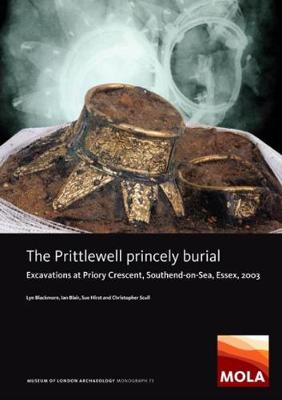MOLA monograph
1 primary work
Book 73
The Prittlewell Princely Burial
by Lyn Blackmore, Ian Blair, Sue Hirst, and Christopher Scull
Published 8 May 2019
An early Anglo-Saxon chamber grave discovered in 2003 at Prittlewell, Southend-on-Sea, Essex, proved to be a princely burial of international significance. Lying beneath a now vanished mound, the large wooden chamber contained the coffin of a man, evidently a Christian from the small gold crosses found with him, who died probably at the end of the 6th century AD. He was buried within or beside an existing cemetery, one used by people of lesser rank, which is reassessed here. The chamber was lavishly furnished with personal items and textiles, a folding stool, a candelabrum and a lamp, a lyre and a gaming board, a scythe and weapons, and an astonishing array of vessels – some still hanging on the chamber wall. His burial suggests that this man had occupied a position at the apex of a hierarchical society, surrounded by a household and retinue – a lifestyle supported by a sophisticated farming regime, a productive agricultural population and skilled craftspeople, and with access to imported luxuries and prestige items. The results of detailed study of the evidence and artefacts found are presented here to give a definitive account of the burial and the grave goods, and to unlock the information they provide about the East Saxon kingdom in which the man lived and its contacts with Kent, Merovingian Francia and the Christian Mediterranean world.
